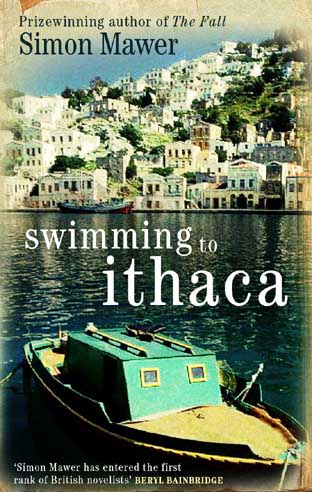 |
Swimming to IthacaPublished by Little, Brown in April 2006 "This is a gripping read." You never really know the past, not even your own. As a university history lecturer such thoughts have always been in Thomas Denham's mind, but following the death of his mother they come to the fore as he picks his way through her papers and photos in an attempt to discover her story. It's a past that he shared as a 10-year-old boy, when his family was posted to Cyprus in the days of EOKA bombs and killings, but Thomas' adult perception of events is very different from his childhood memories. Which is closest to the truth - or are all such reminiscences a kind of fiction? Swimming to Ithaca was published in hardcover by
Little, Brown (April 2006) and came out in Abacus paperback in June
2007 Read Dennis Killin's poems that appear in the novel...
Reviews:From the Independent, May 2006Swimming to Ithaca is a work stalked by ghosts. As well as Deirdre "Dee" Denham, recently deceased mother of the male protagonist, these include the shades of several other novels. The premise - a bereaved child finds incriminating pictures - was explored in Penelope Lively's The Photograph, while the seminar-room interrogations - Thomas Denham teaches at a new university - are reminiscent of Graham Swift's Waterland. "Never forget," Thomas tells his students, "that the word "history" is cognate with the word 'story'." One could wish the point were less regularly made. But Mawer manages to spin arresting patterns out of the familiar material. Deviously constructed and full of red herrings, the path of Dee's affair - Wing Commander Denham is no more than a cipher - leads back to late-1950s Cyprus and three principal suspects: volubly erudite Geoffrey Crozier (author of a Durrell-esque poem that gives the novel its title), gentlemanly but determined Major Braudel ("You must think me a cad") and attentive cabby Nicos. Framed by a backdrop of terrorist outrages in support of Greek irredentism, the moral tension comes courtesy of the news that poetising Geoffrey, supposedly an ornament of the Levant Investment Bank, is actually an MI6 agent for whom Dee's dalliance with her taxi-driving paramour is a convenient way into an EOKA cell. This vista of scorched Mediterranean mornings and icy end-of- Empire protocols benefits from its contemporary foregrounding. Divorced, student-chasing Thomas has his eye on the street-sharp Brixton one-parent family in his tutorial group. World-weary, no- nonsense Kale - there is a key, Oedipal moment where she dresses up in one of the Mrs Denham's frocks - offers a welcome antidote to Thomas's theorising. "Family history's a bit of a luxury," she hazards. Thomas's attitude to her combines a genuine affection for mother and six-year-old daughter with some pitilessly observed glottal stops. The most startling revelation waits until the end. The real victim of Dee's betrayal, Thomas discovers, was someone apparently detached from the family orbit. Reaching descriptive peaks in the italicised accounts of pre-teenage Thomas's flights to Cyprus in the school holidays, Swimming to Ithaca's prose can turn faintly workmanlike. In the end, though, it delivers far more than theme, personnel and opening sequences may have led the reader to expect. DJ Taylor From the Times, June 2006... a John Le Carré-like world of terrorism, spies, uncontrollable sexual passions, blackmail and political murder, involving the British, the Turks and the Cypriots (sic - SM). This is a gripping read. Michelene Wandor From the Independent on Sunday, May 2006The Cypriot narrative blooms with life, a certain intrigue and some sharply drawn characters... James Urquhart
|
|
 Hardback
jacket
Hardback
jacket Paperback
cover
Paperback
cover